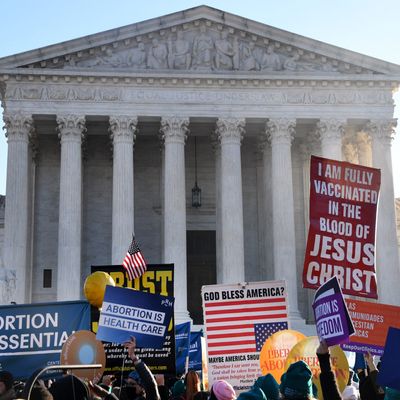
This is how Roe v. Wade ends — without pretense or pretext, the conservative movement’s tireless dream of forced birth, brought to fruition through the naked promises of Donald Trump, who said if he could put “another two or perhaps three justices on,” Roe would be overturned “automatically, in my opinion, because I am putting pro-life justices on the Court.” On Wednesday, all three of Trump’s justices hearing a case challenging Mississippi’s 15-week abortion ban seemed ready to prove him right. Even John Roberts’s feeble attempts at describing, if not actually finding, a compromise would mean overturning all the prior Supreme Court decisions that have made abortion legal.
Oral arguments have misled people into making false predictions before, but if any of the conservatives were inclined to pull a surprise move, there was no sign of it in the almost two-hour-long session. For the first time in nearly 30 years, everyone arguing about abortion before the Court and the justices had to put their cards on the table.
By Supreme Court standards, the session was unusually blunt and at times heated. Stephen Breyer crankily noted that anyone could see it was the arrival of “new members” that had emboldened the right, perhaps hoping the justices Trump nominated might not want to be pawns. As Roberts noticed aloud, the solicitor general of Mississippi had technically been defending a 15-week abortion ban, a stalking horse for overturning Roe, but in later briefs had abruptly pivoted to openly asking for Roe to be overturned. Roberts didn’t say it, but the only thing that changed in between was that Ruth Bader Ginsburg had died and Amy Coney Barrett was confirmed. “Will this institution survive the stench that this creates in the public perception that the Constitution and its reading are just political acts?” Sonia Sotomayor asked pointedly.
It seemed obvious that only Roberts, who vainly tried to focus on the 15-week line even when everyone else made clear it was all or nothing, cares for such appearances. There had been some pre-argument rumblings that Barrett and Brett Kavanaugh might defect, perhaps forming a bloc with Roberts to find some middle ground as happened the last time the Court considered overturning Roe in 1992’s Planned Parenthood v. Casey. On Wednesday, neither Barrett nor Kavanaugh seemed inclined to disappoint the movement that put them on the Court.
Kavanaugh nattered on about how divisive abortion is and how neutral the Constitution is on it, and how, by golly, it’s a big country — “There will be different answers in Mississippi and New York, different in California or Alabama,” he said — with the implication that dominion over one’s body and future is just blue-state elitism.
Barrett did exactly what she was nominated to do, which was to say that forced pregnancy and birth are no big deal because, as she kept repeating, “safe haven” laws allow parents to relinquish their rights and surrender babies to be adopted by others. The concerns the pro-choice side expressed about the effect abortion bans would have on women’s equality, she said, were “focused on the consequences of parenting and the obligations of motherhood that flow from pregnancy. Why don’t the safe-haven laws take care of that problem?” (She added, ominously for the vaccine mandates that are making their way through the courts, “There is without question an infringement on bodily autonomy, which we have in another context like vaccines.”) She didn’t need to say that she has given birth five times and adopted two children and still made it to the Supreme Court; her very presence provided cover to anyone looking for it.
Another tell was how Kavanaugh and Barrett spoke about precedent. Having said the requisite things about respecting precedent in his confirmation hearings before they were overtaken by an allegation of attempted rape and his paean to beer, Kavanaugh recited a clearly memorized list of cases that deserved to be overturned by the Court. Barrett, whose views on the need to sometimes overturn precedent were part of her academic body of work before joining the Court, quoted a line about how stare decisis is “not an inexorable command.”
Two women, Julie Rikelman of the Center for Reproductive Rights and U.S. solicitor general Elizabeth Prelogar, calmly and eloquently argued that abortion is a fundamental right that shouldn’t be put up to a vote, described the importance of precedent, and laid out the evidence for the damage that denying abortion would do to people’s lives. Their words mattered inasmuch as someone had to say it besides the outnumbered liberal justices, but they were very unlikely to change anything. It wasn’t hard to count five votes for overturning Roe.
Wednesday’s arguments also made clear why a majority of the Court went ahead and allowed Texas to effectively ban abortion at six weeks. For three months and counting, Texans have been forced to do one of the following: make rushed decisions, go out of state for an abortion, end their pregnancies on their own in ways that make them vulnerable to prosecution, or remain pregnant against their will. This is the future the conservative justices want. What will change if they rule for Mississippi is that millions more will be in Texans’ position, and with the number of states poised to ban abortion given the chance, they will likely have to travel much farther. We’ll find out by June.






























